Another Step In Toyota’s March To Fuel Cell Powered Pickups
Jason Lancaster | Oct 25, 2016 | Comments 3
While many in the automotive publishing world are fawning over Tesla and battery-powered electric vehicles, we’ve been focused on fuel cell powered vehicles. The reason is simple: We care about trucks, and battery electric pickup trucks just aren’t that feasible.
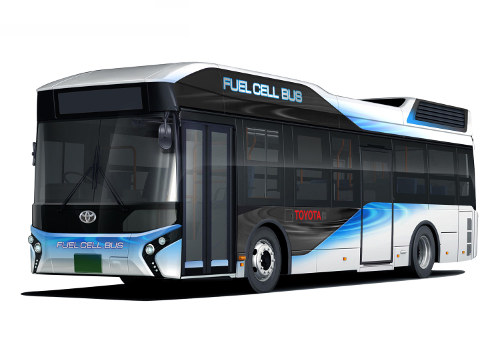
Toyota is officially in the business of selling fuel cell powered buses. Pickups can’t be far off.
Recently, Toyota announced plans to sell fuel cell powered city buses. In all likelihood, these buses are a rough blueprint for a future Toyota Tundra powertrain.
Battery Packs Are A Bad Fit For Pickup Trucks…And Buses
Trucks use a lot of energy, and we know this by looking at fuel economy:
- On the highway, a truck needs 2-3 times as much gasoline as a mid-size car
- In the city, the energy requirements increase even more, as constantly accelerating a 5,000lbs vehicle burns a lot of fuel
- When towing and hauling, the energy requirements go even higher
If a 60kWh battery pack is enough to make a neat little Chevy Bolt (which is basically a compact car) go 200 miles, it stands to reason that a pickup truck will need 180kWh of battery pack to drive the same distance.
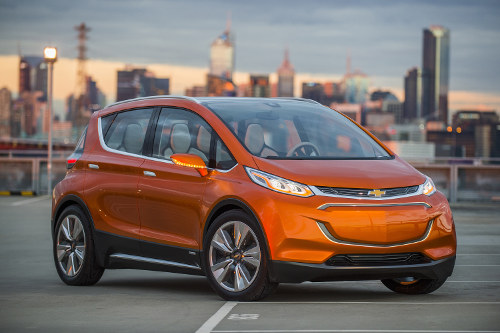
To build a truck that could match the Bolt’s 200 mile battery range, you’d need 2-3 times the battery capacity.
If you triple the size of a battery pack, you triple the cost, you triple the charging time, and you triple the weight. These are all big problems. Of course, the bigger your vehicle gets, the more infeasible battery power becomes. Which brings us to this new Toyota city bus.
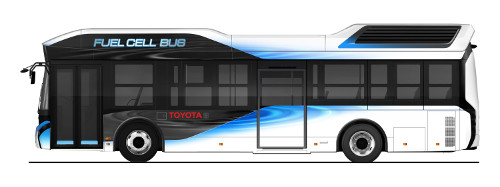
Toyota will begin selling fuel cell powered city buses in Japan next year, which plans to expand this business globally.
Why Fuel Cells Are Great For Buses (and Pickups)
A bus that runs on fuel cells has a lot of advantages:
- It’s quiet and clean. Cities dwellers often appreciate vehicles that don’t make noise and don’t belch out smoke.
- Low up-front costs (relatively speaking). Toyota has not announced pricing, but the Toyota fuel cell bus is basically just a lightweight 34′ bus chassis with two Toyota Mirai powertrains. A diesel hybrid 34′ bus costs about $500k. Replacing the diesel engine with a couple of fuel stacks isn’t going to raise that price very much. A 35′ Proterra battery-electric bus with 100+ miles of range, on the other hand, costs about $800k.
- Reliability. Fuel cells have no moving parts, and provided they aren’t exposed to extreme temperatures or vibrations, they will last for 20,000+ hours of continuous use. A diesel bus engine usually requires a major overhaul after 10,000 hours, for comparison’s sake, and they usually have 300k to 600k miles on the odometer at that point.
- Longevity. A battery pack will degrade after 1,000 charge cycles, and can fail after as few as 3,000 charging cycles. If a battery electric bus is charged twice a day, it will begin to lose capacity in about 16 months. Once this happens, charging frequency will increase. If the degraded battery is charged 3 times per day, it will fail in as little 22 months. That works out to about 3.5 years of life in a worst-case scenario. Best case, we can double that figure. But that still doesn’t compare to the 20,000 life expectancy of a fuel cell stack.
- Driving range. A 35′ Proterra Catalyst battery electric bus has 80-105 kWh of battery capacity, which works out to 50-60 miles of range between charges. Toyota’s fuel cell bus has 235kWh of total energy capacity, which works out to more than twice the range between refueling stops.
If there’s a problem with Toyota’s fuel cell bus – and with fuel cell technology in general – it’s that the performance of these systems isn’t stupendous. Toyota’s new city bus utilizes two fuel cell stacks and two electric drive motors, with a peak torque of about 500 lb-ft (250lb-ft for each drive motor). That’s not a lot of torque compared to a big diesel engine, let alone electric cars from BMW, Tesla, etc.
Still, range, cost, reliability, and durability are all important. It’s easy to see why Toyota is pushing fuel cell technology.
When Will We Get Our Fuel Cell Powered Pickup?
The short answer: we don’t know, but 2022 is when the Tundra will get it’s next big update.
Toyota’s press release about their new fuel cell powered bus suggests the next big announcement of fuel cell technology will come in 2020. That’s about the time when the Mirai will be due for a mid-cycle refresh, so it stands to reason that Toyota will announce something Mirai related at that time.
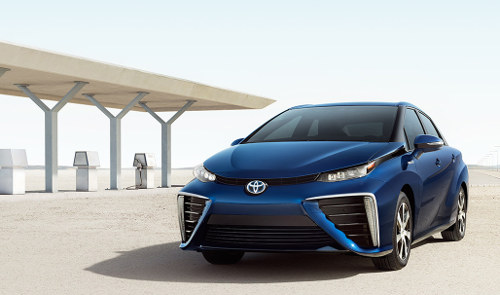
Toyota’s goal is to offer the Mirai, Prius, and Prius Prime at roughly the same price point by 2020 (or so).
Toyota has committed to cutting the cost of fuel cells to make them comparable to gas-electric hybrid powetrains, which means Toyota wants to sell the 2nd generation Mirai in 2020 for the same price as a new Prius or Prius Prime.
If Toyota can cut the cost of fuel cell powertrains that much, it won’t take long for Toyota to put one in the Tundra. While it’s likely this 1st generation fuel cell truck will initially be limited to fleet users in California, the business case is pretty clear: fuel cell powered pickups are zero emissions vehicles, and selling zero emissions trucks is the easiest way to hit meet federal fleet fuel economy requirements.
Not to mention that a few other companies – namely Honda, Hyundai, and fuel cell big rig manufacturer Nikola – have eyed the early 2020’s as the point at which their fuel cell powered vehicles will hit US roadways in large quantities.
Finally, there’s this:
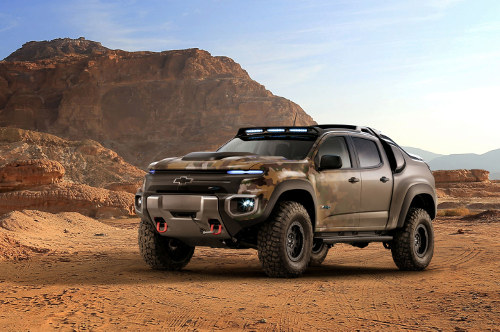
Chevrolet is building a demonstration hydrogen powered military truck for the Dept. of Defense, and they’ve identified 2020 as the point at which fuel cell systems will be commercially viable.
The US Army is very interested in fuel cell powered vehicles, because a) these vehicles can be used to generate electricity in the field, b) these vehicles are stealthy, and c) hydrogen weighs far less than diesel fuel. The logistics of hauling diesel fuel into the battlefield are a pain point for the army, and hydrogen is a great solution.
If the US Army decides to buy a few thousand hydrogen powered pickup trucks for use in the field, you can bet that will have a massive impact on the consumer market.
Filed Under: Tundra News


There is a lot of good meat and potatoes in this article.
With the cars, 18 wheelers, and large buses moving into the hydrogen fuel cell technology “now” perhaps there will be a Fuel Cell Tundra around 2022.
I remember that Ford had a high torque, fuel cell version of the Taurus in the late 1990s or early 2000s which it was testing. They said that because of the high torque, they were closing testing because tires were being shredded off in a few days. Very high torque and veery fun to drive. Each wheel had its own motor.
I think that some form of stored energy would be helpful in a fuel cell vehicle. Regeneration charging of a small, high voltage battery, for instance, so that starting acceleration would be crisp and some reserve torque for passing would make a smaller motor fuel cell vehicle much more palatable. The battery would only be for saving deceleration energy to be used for starting from stops and for passing only. Otherwise the vehicle would run only on it own fuel cells.
But I do think that fuel cells will be the future.
Oh BTW, my 2014 1794 is great and tows great. My 2012 Avalon is wonderful and my 2000
Avalon with 190,000 miles stil runs like a top. Leather init is still new appearing. Toyota has long term reliability and dependability down to a “T”.